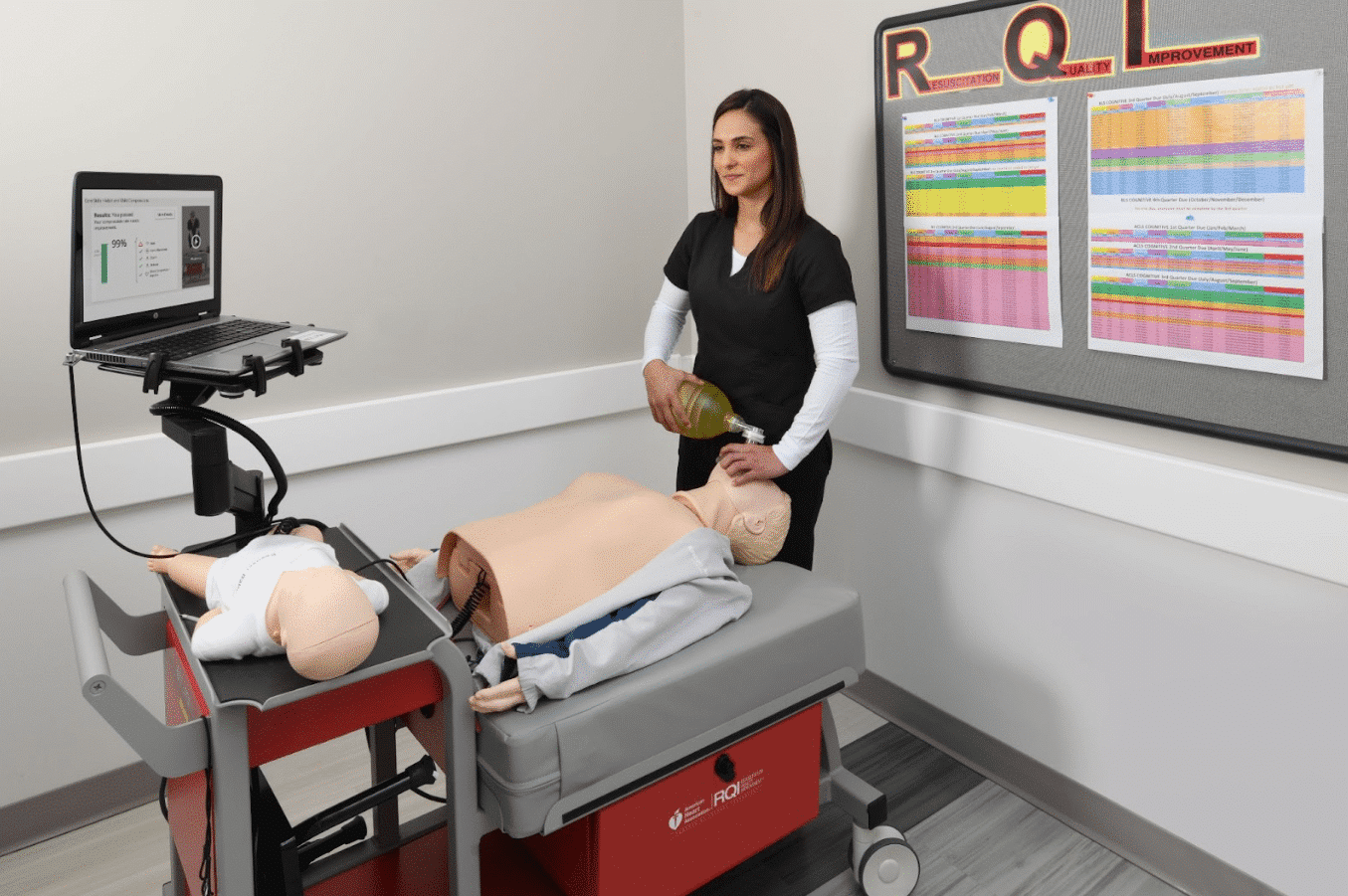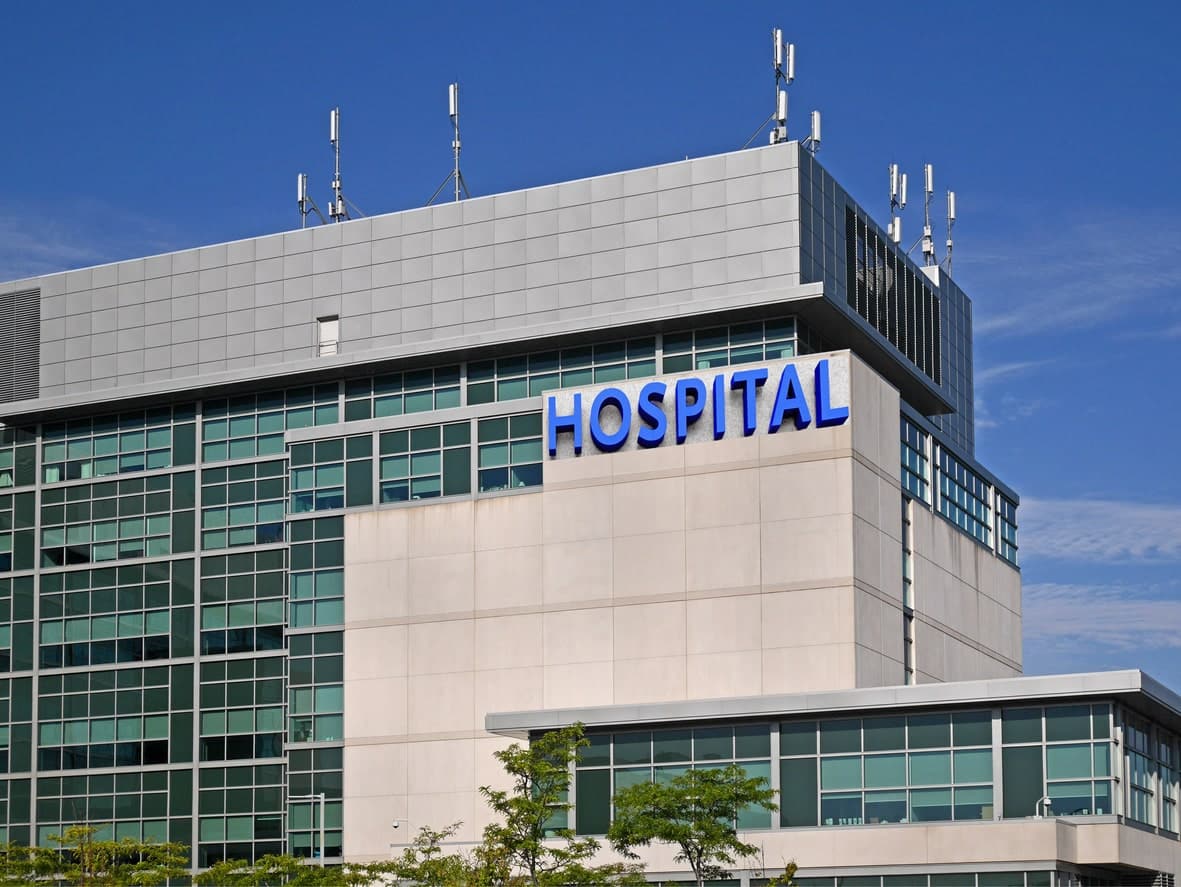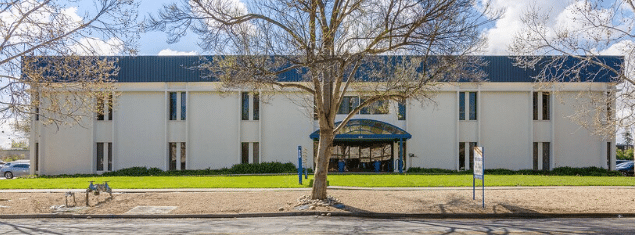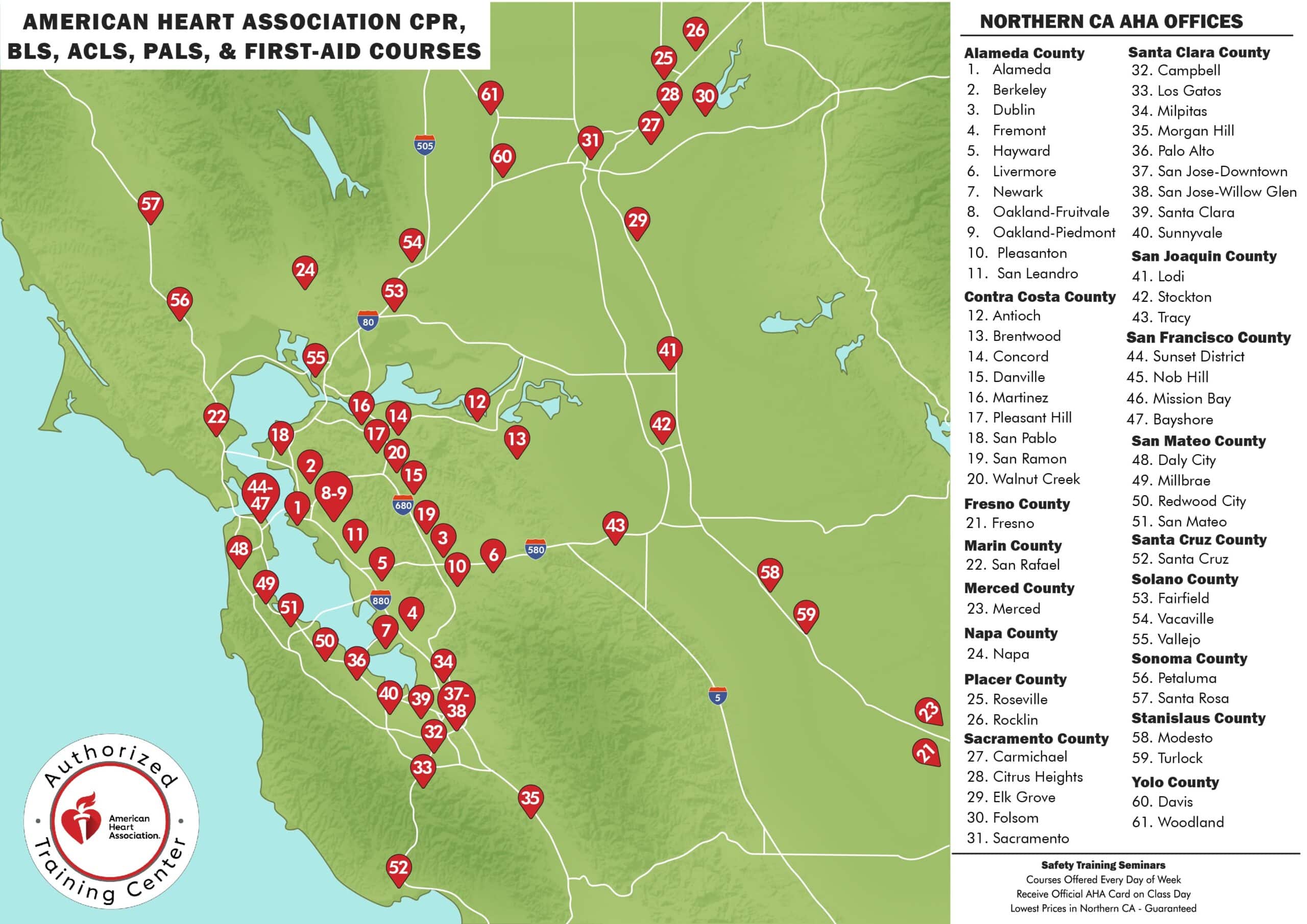
CPR Classes in Sunnyvale
BLS, ACLS, PALS, CPR & First-aid Classes
What is American Heart Association RQI
The American Heart Association RQI (Resuscitation Quality Improvement) program is one of the most popular, modern, and efficient ways for medical and healthcare professionals to receive their official American Heart Association BLS, ACLS, and PALS certification cards.
Three Easy Steps
1. Take the American Heart Association online course at home (a few hours).
2. Arrive to one of our 45 local offices and practice with the VAM (voice assisted manikin).
3. Receive your certification card on the day of the class.

About American Heart Association RQI
Entry Instructions for Sunnyvale CPR Classroom
Healthcare Excellence in Sunnyvale, California: A Closer Look at Medical Facilities
Sunnyvale, California, often referred to as the “Heart of Silicon Valley,” is not only a hub for technological innovation but also boasts a remarkable healthcare system that caters to the diverse needs of its residents and visitors. With a range of state-of-the-art medical facilities and a commitment to quality healthcare, Sunnyvale stands tall as a city that prioritizes the well-being of its community.
Sunnyvale’s Healthcare Landscape
Sunnyvale is home to an array of medical facilities, from world-renowned hospitals to specialized clinics and primary care centers. These institutions collaborate to provide comprehensive healthcare services, ensuring that residents and visitors have access to top-tier medical care.
El Camino Hospital – Sunnyvale Campus
El Camino Hospital’s Sunnyvale campus is a standout institution in the city’s healthcare landscape. With a legacy of excellence spanning decades, it offers a wide range of medical services, including emergency care, surgery, radiology, and maternity services. This facility is equipped with advanced technology and staffed by highly skilled healthcare professionals, making it a vital resource for the community.
Kaiser Permanente Medical Center
Kaiser Permanente is a well-established healthcare provider in Sunnyvale, offering integrated care services that encompass primary care, specialty care, and urgent care. Their commitment to preventive healthcare, combined with a patient-centered approach, ensures that individuals receive the attention and treatment they need to maintain their health.
Sutter Health Palo Alto Medical Foundation
Sutter Health Palo Alto Medical Foundation is another pillar of healthcare in Sunnyvale. This comprehensive medical group offers primary care, specialty care, and a host of medical services, ranging from dermatology to cardiology. Patients benefit from a network of skilled physicians and a focus on innovative healthcare solutions.
Sunnyvale Community Services
Beyond hospitals and medical centers, Sunnyvale also places importance on community-based healthcare. Sunnyvale Community Services is a non-profit organization that provides vital assistance to low-income and homeless individuals and families, including access to healthcare services. Their efforts demonstrate the city’s commitment to ensuring healthcare equity for all its residents.
Cutting-Edge Medical Technology
Sunnyvale’s proximity to Silicon Valley has resulted in a unique synergy between technology and healthcare. The city’s medical facilities often leverage the latest advancements in medical technology. From robotic surgery systems that enhance precision in the operating room to telemedicine platforms that make healthcare accessible remotely, Sunnyvale’s medical institutions are at the forefront of innovation.
Health and Wellness Initiatives
Sunnyvale understands that good health extends beyond medical treatment. The city actively promotes a healthy lifestyle through various wellness initiatives. Parks, recreational facilities, and walking trails are abundant, encouraging residents to stay active. Farmers’ markets offer fresh, locally sourced produce, supporting balanced diets. Furthermore, community events and workshops on mental health and well-being are regularly organized, fostering a holistic approach to health.
Community Engagement in Healthcare
Sunnyvale’s healthcare facilities don’t just serve the community; they actively engage with it. Public health programs, health fairs, and educational seminars are common occurrences. The city encourages its residents to take charge of their health by providing resources and knowledge.
A Bright Future for Healthcare in Sunnyvale
Sunnyvale, California, has not only embraced the technological advancements of Silicon Valley but also the spirit of innovation in healthcare. Its medical facilities stand as shining examples of excellence, offering a wide range of services with an unwavering commitment to quality care. From cutting-edge technology to community engagement, Sunnyvale’s approach to healthcare sets a high standard for cities across the nation.
As Sunnyvale continues to evolve, so too does its healthcare system. With a focus on inclusivity, accessibility, and technological advancements, the city’s medical facilities are poised to lead the way in providing exceptional healthcare for residents and visitors alike. Sunnyvale’s commitment to the well-being of its community shines brightly, ensuring that the city remains a healthy and vibrant place to live.
Life-Saving Skills: Exploring CPR, BLS, ACLS, and PALS Classes
In the realm of emergency medical care, few skills are as crucial as Cardio-Pulmonary Resuscitation (CPR) and Advanced Cardiac Life Support (ACLS), Basic Life Support (BLS), and Pediatric Advanced Life Support (PALS) techniques. These life-saving techniques form the backbone of first response and medical intervention, often making the difference between life and death in critical situations. Let’s delve into the significance of each of these classes and their role in maintaining public health and safety.
Cardio-Pulmonary Resuscitation (CPR): CPR is a fundamental life-saving technique that can be administered by trained individuals to sustain blood circulation and provide artificial respiration when a person’s heart has stopped beating. CPR involves a combination of chest compressions and rescue breaths, aimed at keeping oxygenated blood flowing to vital organs until professional medical help arrives. CPR classes provide participants with the skills to recognize cardiac arrest, perform effective chest compressions, and deliver rescue breaths. These classes are vital for both medical professionals and laypersons, empowering them to respond swiftly and effectively in emergencies.
Basic Life Support (BLS): BLS takes CPR skills to the next level by incorporating additional techniques and equipment usage. BLS classes are designed for healthcare providers, including doctors, nurses, paramedics, and emergency medical technicians (EMTs). Participants learn how to assess a patient’s condition, deliver high-quality CPR, and use automated external defibrillators (AEDs) to restore a regular heartbeat. BLS training emphasizes teamwork, effective communication, and quick decision-making to optimize patient outcomes during cardiac emergencies.
Advanced Cardiac Life Support (ACLS): ACLS is an advanced course tailored for healthcare professionals who are involved in the management of cardiac arrest and other cardiovascular emergencies. ACLS builds upon the foundation of BLS and focuses on identifying and treating potentially life-threatening conditions such as stroke, myocardial infarction, and arrhythmias. Participants learn to interpret electrocardiograms (ECGs), administer medications, and perform advanced airway management. ACLS classes equip medical personnel with the skills to respond confidently to complex cardiac scenarios, ensuring comprehensive care for critically ill patients.
Pediatric Advanced Life Support (PALS): PALS training is geared towards healthcare providers who care for infants and children during emergencies. Pediatric patients have unique physiological needs, making PALS classes essential for those working in pediatrics, emergency medicine, and intensive care. PALS courses cover topics such as pediatric assessment, effective respiratory support, and the management of pediatric cardiac arrest. Participants gain the knowledge and skills necessary to provide specialized care and interventions that can make a critical difference in the outcomes of pediatric emergencies.
NRP, or Neonatal Resuscitation Program, is a critical medical initiative that focuses on saving newborns who struggle to breathe at birth. This specialized training equips healthcare providers with the skills to assess and manage respiratory distress in infants. NRP emphasizes a systematic approach, teaching effective ventilation techniques and chest compressions if needed. Regularly updated guidelines ensure that participants stay current with the best practices in neonatal care. By enhancing healthcare professionals’ abilities to respond swiftly and effectively to newborn respiratory challenges, NRP plays a vital role in improving infant survival rates and ensuring a healthier start to life.
First-aid classes offer indispensable life skills that empower individuals to respond confidently in emergencies. These structured courses cover a spectrum of situations, from minor injuries to critical incidents, teaching participants how to provide immediate care before professional help arrives. Participants learn to administer CPR, treat wounds, manage choking, and address common health crises. Hands-on training fosters essential skills and boosts confidence, enabling swift and effective action in times of need. First-aid classes are invaluable for workplaces, homes, and communities, creating a network of capable first responders. Mastering these skills not only saves lives but also fosters a safer and more prepared society.
Incorporating these life-saving techniques into healthcare systems, workplaces, and communities can significantly enhance the response to medical emergencies. Quick and effective interventions provided by individuals trained in CPR, BLS, ACLS, and PALS can stabilize patients and improve their chances of survival before professional medical assistance arrives. Moreover, these classes promote a culture of preparedness, empowering individuals to step forward and take action when faced with emergency situations.
In conclusion, American Heart Association CPR, BLS, ACLS, and PALS classes play an indispensable role in equipping individuals with the skills and knowledge needed to respond effectively to various medical emergencies. These courses bridge the gap between bystander assistance and professional medical care, ultimately contributing to improved patient outcomes and increased survival rates. By investing in these life-saving classes, individuals and healthcare professionals alike become vital links in the chain of survival, ensuring that timely and appropriate care is delivered when it matters most.
Our Blog

Hospitals & Medical Centers in Sunnyvale
Stay informed, stay prepared, and take proactive steps towards maintaining your health with the exceptional medical institutions in Sunnyvale, CA.

Why CPR is Important in Healthcare
Cardio-pulmonary resuscitation (CPR) is a life-saving technique that everyone should know how to perform. It involves a series of actions designed to help someone who has stopped breathing or whose

7 Common CPR Myths Debunked
Cardiopulmonary resuscitation (CPR) is a life-saving technique that can help a person in the event of cardiac arrest. It involves chest compressions that are performed until medical professionals arrive or

Importance of Workplace CPR & First-Aid Training
Accidents can happen anytime and anywhere, even in the workplace. Although we may try our best to ensure a safe and healthy work environment, we can’t predict or prevent all


